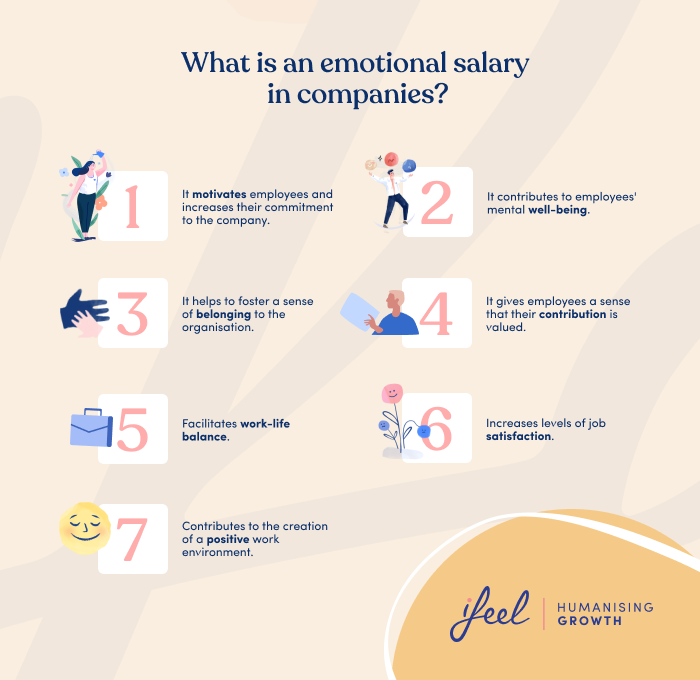Nowadays, the label “emotional salary” is used to identify non-financial benefits that a company offers to its teams that are not strictly monetary. These benefits are also considered “social benefits” and are one of the most trendy techniques for attracting and retaining talent within the company.
| Classic examples of “emotional salary” | |
| 1. | Growth opportunities within the company |
| 2. | Personal and professional development |
| 3. | Good working environment |
| 4. | Employee-friendly corporate culture |
| 5. | Work-life balance |
| 6. | Involved in company decisions |
| 7. | Possibility of remote working |
| 8. | Time flexibility |
| 9. | Personal recognition (in the form of positive reinforcement). |
What is the emotional salary?
It is any intangible benefit perceived by employees that increases their perception of well-being at work.
How are employees paid an emotional salary?
Through attitudes, gestures, and other types of social benefits that are “exchanged” in the form of motivation and job satisfaction.
What is the purpose of “earning” an emotional wage?
Because the economic salary is not always enough to optimise the employee’s experience since non-monetary aspects also nourish it.
Can I ask for an emotional salary increase?
Of course, you only have to identify which emotional aspects the company can improve for you and convey them to the people in charge through the appropriate channels.
The advocates of this philosophy base their argument on one indisputable fact: more and more people today are asking their companies to pay them alternatives to money. Or, at least, more people would like to have them. This is true, and it makes a lot of sense to do so: money is not everything, and it does not compensate the other working conditions if they are bad or poor.

From this point of view, it is good to try to enhance aspects of work and professional life in the workplace’s everyday life. It is a question of conditions that nourish and motivate the employee without this being reflected in their bank account at the end of the month.
What should be included in the emotional salary
Social benefits must be consistent with the rest of the working conditions and accompany the economic salary in a balanced way. That way, all retributions will transmit the same message to the worker and there will be no interference between them.
Workers appreciate a good work environment in the office and an approachable and talented manager. They also appreciate being organised through flexible working hours and being considered when implementing decisions that affect them. These are crucial factors in any worker’s occupational health, and it’s great to see them boosted.
However, have you considered the possibility of taking care of your employees’ health further and offering them an online therapy service? It would be a great idea to promote their well-being more holistically.
Ifeel has a mental well-being solution for companies designed specifically for that purpose: to provide continuous professional psychological care tailored to the needs of your employees, which you can include among the benefits of working in your team. In addition, we can advise your company’s HR managers to find short, medium, and long-term solutions customised to your needs in terms of mental health at work.

What is the best way to approach emotional salary?
The benefits that usually fall under the label of emotional salary are very valuable. Moreover, it is good for a company to make an effort to offer them to its employees.
However, as we have just pointed out, the company’s challenge is presenting them to the employee so that they are more useful and do not convey the wrong message. The best thing to do is to make them what they are: a set of good working conditions that benefit everyone, that are not (only) aimed at alleviating a possible deficit in the economic salary and that, above all, are aimed at taking care of the employee and communicating to them that they are valuable to the company.
Think about what you want to call this type of benefit in your company. If the expression “emotional salary” is problematic, avoid sensitivities and look for a name that better fits what you offer to the employee. If you consider it appropriate, simply keep it, always explaining effectively to the beneficiaries what the salary is about since it is good for them to be aware that they are receiving it.
How do we address emotional salary properly?
Regardless of what we call the non-financial benefits that our company offers its employees, let’s take a look at some tips to maximise their advantages.
1. Be clear with what you offer
Offer as an “emotional salary” only those things that are clearly a plus, and that cannot be considered as an indispensable minimum. This way, the company acquires a differential value concerning others and becomes more attractive regarding talent retention.

In this sense, a good example of emotional salary would be to offer the possibility of receiving psychological care through specialised online platforms. The company is not obliged to do so, but if it does, it is a very appreciated detail and contributes to the team’s wellbeing. If you decide you want to do this, you can consult ifeel’s emotional well-being program for companies. Through this program your employees will have access to the online therapy service in a totally confidential, constant, and comfortable way, with the possibility of having daily communication with a psychologist, taking care of their mental health, and improving their productivity.
On the contrary, a less powerful example of an emotional salary would be offering a good working environment or expressions of personal recognition, as this should be included as a starting point in any well-functioning company.
2. Targeting different salaries
Ideally, staff should have an adequate financial salary before putting energy into promoting a good “emotional salary”. People indeed want to work in a pleasant place, performing tasks that allow them to grow and gain recognition. But workers are also concerned about paying for groceries, children’s school, English classes, or their bills.
The worker will likely be satisfied with a poor salary but good non-financial conditions. However, this will only last in time in the case of jobs that are highly motivating/enriching in themselves, people who have no other work alternatives, or those who tend to settle in. The rest -those who are not motivated enough or have alternatives- will leave in search of better opportunities. Where to? Where they are better paid, both financially and “emotionally”.
That is why you should try to ensure that the company’s economic aspects are covered properly because that already satisfies the worker and satisfaction is the first step towards an emotional salary. In addition, you should focus the emotional salary on those benefits that make your worker’s life easier and more pleasant, and in a way that is as directed to their particular needs as possible.
3. Ask your team what they need
When in doubt, asking employees what they value, what they need, how they feel, or how the company could make their lives easier is more useful than taking what will motivate them for granted. In other words: taking them into account when deciding what emotional salary they want is also to start paying them the emotional salary.
In companies, especially those with a large workforce, people are very diverse in terms of age, lifestyles, family burdens, job categories… This means that not all possible benefits are equally powerful for everyone. Therefore, if you also want to prevent comparative grievances, you should avoid discretionary compensation for one type of worker at the expense of another.
A typical example of this mistake would be to reserve remote work, flexible working hours, and the use of the company’s financial resources (e.g. discounts on private childcare) for those who have dependent children and not to have any equivalent consideration for those who are single (young and not so young) on the assumption that they are more available and can act as a counterbalance.

4. Ask for external help
If you are responsible for this type of issue in your company, you are not expected to know how to hit the nail on the head. It is more useful for you to realise what might be going wrong and ask for specialised help to start fixing it.
To assist in this process, our team of psychologists specialising in mental well-being has developed a mental well-being program for companies aimed at helping companies enhance employee engagement and boost productivity.
This collaboration allows HR managers to receive personalised, data-based advice on the most effective measures for detecting employee mental health issues and assessing the workplace climate. It’s the best way to understand their needs.
Moreover, ifeel’s corporate mental well-being solution offers employees a structured mental health care service tailored to their needs at any time.
We hope you found this article on the emotional salary interesting. If you want more information about our mental well-being solution for companies, simply request it, and we will contact your team soon.






